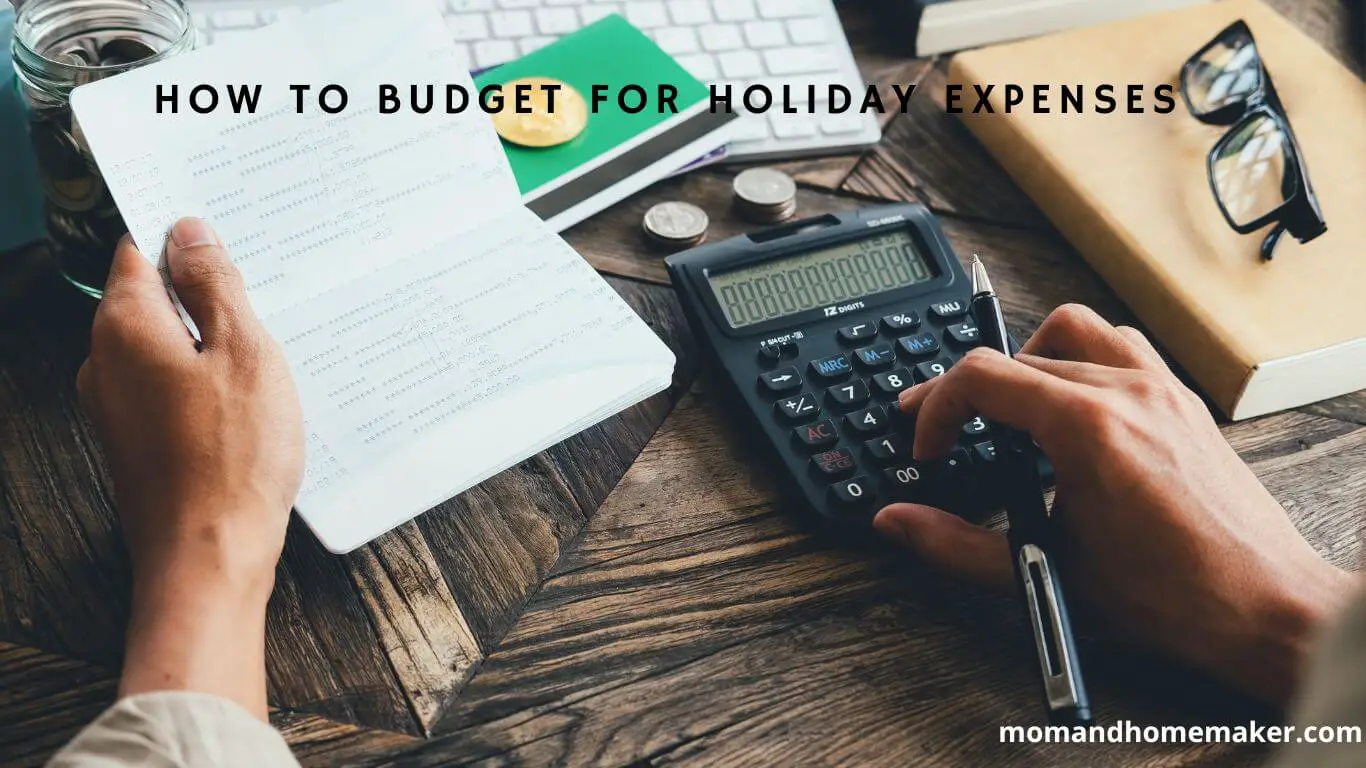The holiday season is just around the corner, and along with the joy and excitement comes the concern about managing your finances. Budgeting for holiday expenses can feel overwhelming, but it doesn’t have to be.
With a little preparation and some proven strategies, you can confidently plan your holiday budget and avoid overspending. Whether you’re saving for a lavish family vacation or a simple weekend getaway, understanding how to prioritize your expenses and make the most of your budget will ensure a memorable and worry-free holiday experience.
From setting clear financial goals to resisting impulse buying, these tips will help you create a realistic holiday budget and make the most of your funds.

Set Clear Financial Goals
Start by clearly defining your financial goals for the holiday season. Setting clear financial goals is important for effectively budgeting during this festive time of year. By having a clear vision of what you want to achieve financially, you can create better budgeting strategies and ensure your spending aligns with your goals.
Once you have established your financial goals, it’s time to create a budgeting strategy that works for you. Begin by analyzing your income and expenses.
Look for areas where you can cut back or save money. Consider setting aside a certain amount each month leading up to the holidays to help cover expenses without straining your budget.
Assess Your Current Financial Situation
Assessing your current financial situation is an important step in understanding where you stand financially and creating a spending plan for the holiday season. Let’s break it down into three key areas:
- Evaluate your income and expenses:
Take a close look at how much money you bring in each month and compare it to your expenses. Are you spending more than you earn? Look for areas where you can cut back on your spending. By understanding your cash flow, you can determine how much you can allocate towards your holiday expenses.
- Review your debts and savings:
Take a moment to assess your debts, such as credit card balances and loans. Figure out how much you owe and the interest rates associated with each debt. Evaluate your savings, including emergency funds and retirement accounts. Consider whether it’s feasible to use some of your savings for holiday spending or if it’s wiser to focus on paying off your debts.
- Assess your financial goals:
Reflect on your long-term financial goals beyond the holiday season. Do you have any milestones or aspirations you’re working towards? Understanding your broader financial objectives will help you prioritize your holiday spending and avoid unnecessary financial strain.
Track Your Holiday Expenses
To effectively track your spending during the holidays, it’s important to keep a detailed record of all your expenses. By doing so, you can easily see where your money is going and make adjustments if needed.
One way to track your holiday expenses is by using a budgeting app or spreadsheet. These tools allow you to enter your expenses, categorize them, and set spending limits for different categories such as gifts, travel, and food. This helps you stay within your budget and identify areas where you can save money.
Another tip is to save your receipts. By holding onto them, you can refer back to them when updating your budget or returning items, ensuring you have an accurate record of all your expenses.
If you’re planning on traveling during the holidays, it’s especially important to track your expenses. Make sure to keep track of transportation costs, accommodation expenses, and any additional fees for activities or attractions. This will help you avoid overspending and make necessary adjustments.
Create a Realistic Holiday Budget
Creating a realistic holiday budget is essential for managing your expenses and avoiding unnecessary debt. To do this effectively, start by assessing your financial situation and determining how much you can afford to spend. This will help you set a spending limit and prioritize your expenses.
Instead of overspending, consider cost-effective alternatives such as homemade gifts or DIY decorations. Planning and budgeting early will allow you to allocate specific amounts for each expense category. Keeping track of your spending is crucial, as it will help you stay within your budget.
Avoid impulse buying and stay disciplined by reminding yourself of your financial goals. By following these tips and strategies, you can create a realistic holiday budget and enjoy the season without financial stress.
Prioritize Your Holiday Spending
When prioritizing your holiday spending, it’s important to carefully consider your financial goals and allocate your budget accordingly. As you navigate through the holiday season, there are ways to save money and manage your expenses effectively while still enjoying the festivities.
To save money during the holidays, start by creating a list of your priorities. Identify the most important aspects of the holidays for you and your loved ones, such as spending quality time together, exchanging thoughtful gifts, or hosting a memorable gathering.
Another tip for managing holiday expenses is to set a budget for each category. Allocate a specific amount of money for gifts, decorations, food, and other holiday-related expenses. This will help you stay on track and prevent overspending. Instead of using credit cards, consider using cash or debit cards to avoid accumulating unnecessary debt.
Don’t forget to take advantage of sales, discounts, and coupons during the holiday season. Keep an eye out for special promotions and compare prices before making any purchases.
Cut Back on Non-Essential Expenses
Minimize unnecessary spending during the holiday season by cutting back on non-essential expenses. This will help you save money and stay within your budget while still enjoying the festivities. Here are some practical ways to reduce unnecessary purchases and find cheaper alternatives:
- Evaluate your subscriptions: Take a look at your monthly subscriptions and identify any that you can live without or temporarily cancel during the holiday season. This can include streaming services, gym memberships, or beauty boxes.
- Plan and cook meals at home: Instead of dining out or ordering takeout frequently, plan your meals and cook at home. This not only saves money but also allows you to create delicious holiday meals and treats that you can share with loved ones.
- Make DIY gifts and decorations: Get creative and make your gifts and decorations. This will save you money and add a personal touch to your holiday celebrations. Consider making homemade candles, ornaments, or baking cookies to give as gifts.
Plan for Extra Holiday Costs
During the holiday season, it’s important to plan for all the extra expenses that can come up. This includes gifts and decorations, but it’s also crucial to be prepared for unexpected costs. Here are some tips to help you navigate the holidays without breaking the bank.
Set aside some money specifically for unforeseen expenses. This could be for last-minute party invitations, unexpected travel costs, or emergency gift purchases. By budgeting for these extra costs, you’ll avoid any financial stress.
Create a separate budget category for miscellaneous expenses. This could be for things like holiday-themed clothing, extra baking supplies, or donations to charity.
Also, look for ways to save money on common holiday expenses. Keep an eye out for sales, discounts, and coupons when shopping for gifts or decorations. Consider making DIY projects or homemade gifts to save on costs. And compare prices to find affordable options for food, entertainment, and travel.
Consider Homemade Gifts and Decorations
If you want to save money and add a personal touch to your holiday celebrations, consider making homemade gifts and decorations. This not only helps you stick to your budget but also gives you a sense of fulfillment as you put time and effort into creating something special for your loved ones.
Here are some ideas to inspire you:
- Homemade gift ideas:
- Hand-knitted scarves or hats: Choose a soft yarn in your loved one’s favorite color and make a cozy accessory for the winter months.
- Personalized photo albums: Gather your favorite pictures and create a beautiful album that captures precious memories. Add handwritten notes and captions to make it extra special.
- Homemade candles or soaps: Get creative with scents and packaging to make unique and personalized gifts that will bring warmth and relaxation to your loved ones’ homes.
- DIY holiday decorations:
- Handmade wreaths: Collect natural materials like pinecones, branches, and berries to create a festive wreath for your front door.
- Upcycled ornaments: Give old or unused items a new life by adding a coat of paint, glitter, or ribbons to turn them into beautiful ornaments. This not only saves money but also adds a personal touch to your decorations.
- Hand-painted stockings: Personalize your stockings by painting them with festive designs or the names of each family member. This adds a special touch to your holiday decor and creates a sense of belonging.
Take Advantage of Sales and Discounts
To save money on holiday expenses, be sure to take advantage of sales and discounts. This is a great way to stretch your budget and get more for your money. You can find great deals online by checking out exclusive discounts and promotions on retailers’ websites.
It’s also helpful to compare prices online to ensure you’re getting the best deal possible. There are plenty of websites and apps that make it easy to compare prices across different retailers, so you can find the lowest price for the items you need.
By taking the time to research and shop around, you can save a significant amount of money on your holiday purchases. Whether you’re looking for a discounted electronic gadget for your tech-savvy friend or a cozy sweater for your loved one, taking advantage of sales and discounts is a smart way to save money and still give thoughtful gifts.
Use Cash or Debit Cards Instead of Credit Cards
To maximize your savings and avoid unnecessary debt during the holiday season, consider using cash or debit cards instead of credit cards. There are several reasons why using cash or debit cards can be a better option:
- Transparency: Cash and debit cards allow you to see exactly how much money you have and how much you’re spending. This helps you stay on track with your budget and avoid overspending.
- Avoiding interest charges: Credit cards often come with high interest rates, which can quickly add up if you carry a balance. By using cash or debit cards, you can avoid these interest charges and save money in the long run.
- Discouraging impulse purchases: Paying with cash or debit cards makes you more mindful of your spending. Unlike credit cards, where you can easily swipe without thinking, using cash or a debit card forces you to consider each purchase carefully.
Using credit cards during the holiday season can significantly impact your expenses. It’s easy to get carried away and spend more than you can afford, leading to credit card debt that can take months or even years to pay off.
Start Saving Early for the Holidays
It’s never too early to begin saving for the holidays. Setting clear savings goals is important to help you stay on track and avoid overspending during the festive season. By planning, you can overcome financial challenges and have a stress-free holiday.
To start, determine the amount of money you want to save for the holidays. Setting a specific goal will give you something to work towards and keep you motivated. Break down your goal into smaller, manageable amounts and set a timeline for saving. This will make the process less overwhelming and more achievable.
Find strategies to overcome financial obstacles during the holiday season. One effective strategy is to create a holiday budget and stick to it.
This will help you prioritize your spending and avoid unnecessary expenses. Consider cutting back on non-essential items or finding ways to save money, such as shopping for gifts on sale or making homemade presents.
Another strategy is to open a holiday savings account. This separate account can be used exclusively for holiday expenses and will help you track your progress toward your savings goal. Consider automating your savings by setting up automatic transfers from your paycheck or checking account into your holiday savings account.
Find Ways to Supplement Your Income
During the holiday season, it’s a good idea to find ways to increase your income. This can help cover holiday expenses and make the season more enjoyable. Here are some side hustles you can try to boost your earnings:
- Freelancing: If you have skills like writing, graphic design, or photography, freelancing is a great way to earn extra money. You can offer your services on freelance platforms or reach out to local businesses.
- Online surveys and market research: Many companies are willing to pay for your opinion. Participating in online surveys and market research studies is a simple and convenient way to earn some extra cash.
- Renting out a room or property: If you have a spare room or property, consider renting it out on platforms like Airbnb. This can be a lucrative way to earn passive income during the holiday season.
Supplementing your income through side hustles not only helps cover holiday expenses but also gives you a sense of achievement and belonging. So, why not explore these opportunities and make this holiday season financially stress-free?
Avoid Impulse Buying
During the holiday season, it’s important to avoid impulse buying to stay on budget. We all know how tempting it can be to make spontaneous purchases, especially when there are flashy sales and enticing offers all around. However, giving in to these triggers can quickly derail your budget and leave you feeling overwhelmed with debt.
To resist impulse buying, it’s important to have strategies in place.
One effective strategy is to create a shopping list before heading out to the stores or browsing online. By knowing exactly what you need to purchase, you can stay focused and avoid getting swayed by unnecessary items. It’s also helpful to set a budget for each shopping trip and stick to it. This will prevent overspending and ensure that you stay within your financial limits.
Taking a moment to pause and reconsider before making a purchase can also be beneficial. Ask yourself if you really need the item or if it’s just an impulsive desire. By evaluating your purchase, you can make more informed decisions and avoid regret later on.
Review and Adjust Your Budget Regularly
To effectively manage your holiday expenses, it’s crucial to regularly review and adjust your budget. This practice will help you stay on track and achieve your financial goals. Here are some key reasons why reviewing and adjusting your budget should be a regular habit:
- Track your progress: By regularly reviewing your budget, you can assess how well you’re sticking to your financial goals. This allows you to make necessary adjustments to ensure you stay on track.
- Identify areas of overspending: Consistently reviewing your budget helps you pinpoint any areas where you might be overspending. This allows you to make changes and find ways to cut back on unnecessary expenses.
- Adapt to changing circumstances: Life is full of unexpected events that can impact your finances. By regularly reviewing and adjusting your budget, you can adapt to these changes and ensure your financial goals remain achievable.
Remember, reviewing and adjusting your budget is a proactive approach to staying in control of your holiday expenses. It allows you to make informed decisions and prioritize your financial well-being.
Conclusion
Budgeting for holiday expenses is crucial for a stress-free and enjoyable holiday season. By carefully planning ahead of time and considering all potential expenses, you can ensure that you have enough funds to cover the costs of gifts, travel, accommodations, and other holiday-related expenses.
Budgeting also helps avoid the stress and anxiety that often come with overspending or going into debt during the holidays. With a well-thought-out budget, you’ll have a clear picture of your financial situation, allowing you to make informed decisions and prioritize your spending accordingly.











